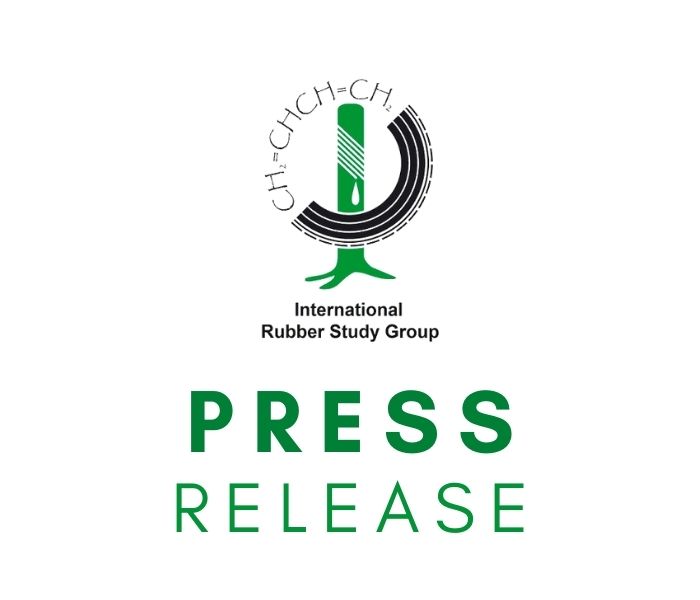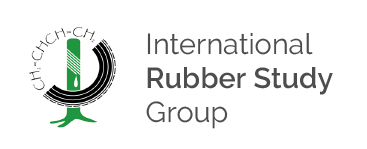
Natural rubber is a strategic raw material for which there are no sustainable alternatives. Natural rubber plantations cover around 14 million ha and produced a total of 13.01 million tonnes in 2019 (IRSG), with a compound annual rate of 1.8% in the last decade.
Thailand and Indonesia produced 56% of the world's total in 2019, with Southeast Asia representing 84% of global rubber production (IRSG, 2021).
Rubber production sustains about 40 million people globally, with around 90% of production coming from small plantations. Rubber is used in more than 5,000 products, predominantly in the automotive and aircraft industry, with more than 70% of production directed used in automobile tyres and non-tyre automotive parts.
Impact of Climate Change on the rubber industry
Developing a white paper based on the IRSG statistical model
The collaboration will see research used to re-calibrate the IRSG Statistical Model to predict the supply and demand of natural and synthetic rubber by factoring in the new determinants or changes in this industry (including upstream and downstream across the supply chain).
Based on the new calibrated model, the researchers will propose a white paper on how climate change affects global rubber trading from the supply chain perspective and how it will impact livelihoods and communities.
Says Salvatore Pinizzotto, Secretary-General of IRSG: “More research needs to be done to measure and ensure that natural rubber is produced and distributed with the best sustainable practices. A rigorous knowledge-driven approach will be the main driver for a more effective decision-making process along all the rubber supply chain and to improve the well-being of smallholders’ communities worldwide.”
Further collaborations in the pipeline to track traceability and sustainability in the rubber supply chain
The collaboration between IRSG and NTU could be further developed after the first year to focus on sustainability in the rubber industry beyond plantation to the supply chain.
Traceability is one of the most challenging aspects of sustainability in the natural rubber supply chain since about 85 percent of the global natural rubber is produced by small independent stakeholders with little interaction with downstream companies.
Furthermore, the natural rubber supply chain is complex and sees the participation of many independent middlemen who buy rubber from small farmers and sell it to processors. Keeping track of the origin of rubber in such a context is, therefore, challenging.
Additionally, it is even more complex for buyers further downstream to assess sustainability performance and the production standards of the independent producers.
As natural rubber is non-perishable, it can be stored for a long time and travel long distances. This means having access to factory production dates and locations may not provide meaningful information related to smallholders and plantations.
Says Research Director of the Centre of Excellence International Trading (CEIT) Assistant Professor Ru Hong, who is also from NTU’s Nanyang Business School: "Rubber is one of the most important commodities in the world, supporting more than 40 million people directly, and much more indirectly. As such, it is important to learn how to ensure both plantations and supply chains are sustainable."
To support the research collaboration, IRSG has contributed financially as a corporate partner to the NTU CEIT Ph.D. scholarship.
***END***
Media contact:
Mr Salvatore Pinizzotto
Title: Secretary-General
International Rubber Study Group (IRSG)
Email: secgen@rubberstudy.org
About International Rubber Study Group (IRSG)
The International Rubber Study Group (IRSG) is an inter-governmental organization based in Singapore, with the main objective of improving the transparency of the world rubber market and strengthening international cooperation on rubber issues. It is the biggest worldwide community in the rubber economy. Our members, subscribers, and partners represent governments, companies, and organizations that are shaping and transforming the rubber industry in strategic and socially responsible ways.
The Group is a platform for senior executives and representatives to provide insights through dedicated meetings, working groups, conferences, and projects. The annual IRSG meetings are amongst the largest regular assemblies of rubber experts worldwide.
IRSG offers a unique opportunity to enhance collaboration beyond each company or organization peer group and connect with young leaders and innovators or established entrepreneurs.
For more information, visit www.rubberstudy.org
About Nanyang Technological University, Singapore
A research-intensive public university, Nanyang Technological University, Singapore (NTU Singapore) has 33,000 undergraduate and postgraduate students in the Engineering, Business, Science, Humanities, Arts, & Social Sciences, and Graduate colleges. It also has a medical school, the Lee Kong Chian School of Medicine, established jointly with Imperial College London.
NTU is also home to world-renowned autonomous institutes – the National Institute of Education, S Rajaratnam School of International Studies, Earth Observatory of Singapore, and Singapore Centre for Environmental Life Sciences Engineering – and various leading research centres such as the Nanyang Environment & Water Research Institute (NEWRI) and Energy Research Institute @ NTU (ERI@N).
Ranked amongst the world’s top universities by QS, NTU has also been named the world’s top young university for the last seven years. The University’s main campus is frequently listed among the Top 15 most beautiful university campuses in the world, and it has 57 Green Mark-certified (equivalent to LEED-certified) building projects, of which 95% are certified Green Mark Platinum. Apart from its main campus, NTU also has a campus in Singapore's healthcare district.
Under the NTU Smart Campus vision, the University harnesses the power of digital technology and tech-enabled solutions to support better learning and living experiences, the discovery of new knowledge, and the sustainability of resources.
For more information, visit www.ntu.edu.sg
About Nanyang Business School
Consistently ranked among the world's premier business schools, Nanyang Technological University's Nanyang Business School (NBS) has been preparing leaders for business and public service, advancing global management knowledge and practice for decades. Being fully integrated into Nanyang Technological University, we draw on the strengths of one of Asia's most comprehensive research-intensive universities to provide holistic, interdisciplinary business education. NBS believes that responsible and culturally sensitive leadership in business and government is key to securing a sustainable future for a globalized world. Through our teaching and research, we are well-placed to empower the next generation of business leaders to innovate for the future, lead with impact, and transform with cultural dexterity.
For more information, visit https://www.ntu.edu.sg/business
Enclosed a copy of the press release in pdf

